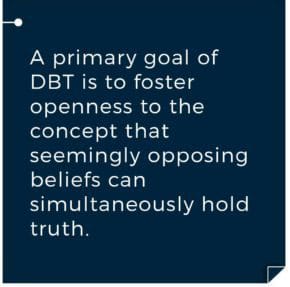- Jul 10
- AddictionAddiction TherapyTreatment
What is Dialectical Behavior Therapy (DBT)?
Dialectical Behavior Therapy (DBT) was originated in response to a need for improved treatment of individuals with borderline personality disorder. However, the application of DBT has since expanded to treating people with a variety of mental health or substance use disorders. DBT was modified from Cognitive Behavioral Therapy (CBT) to place emphasis on providing skills training to help patients manage their emotions, allowing thoughts and behaviors to remain consistent with individual values.
What is Dialectical Behavior Therapy? The Main Components:
Core mindfulness – a mental state of awareness, openness, and acceptance
- Interpersonal effectiveness – skills that support successfully balancing the needs of the individual with the rights and experiences of others
- Emotion regulation – skills that support the ability to experience a range of emotions in the moment while maintaining perspective and behaving consistent with one’s values
- Distress tolerance – skills that allow for resilience through periods of physical or emotional pain
- Wise mind – the ability to experience both emotion and rational thought in balance
- Dialectics – the concept that seemingly opposing ideas both hold truth
A primary goal of DBT is to foster openness to the concept that seemingly opposing beliefs can simultaneously hold truth. The implication is that the emotional experience and beliefs of an individual maintain validity even when others appear to hold contradicting beliefs. The openness to more than one “truth” encourages the ability to take the perspective of others and avoid the need to defend one “truth.” Therefore, addiction treatment programs can support patients to both accept their emotions while also remaining open to change in order to improve their ability to meet their needs.
What are the Benefits of Dialectical Behavior Therapy?
- Motivates individuals to change the aspects of their lives that they have control over.
- Gives the individual the confidence to embrace positive changes in their life.
- Decreases behavioral patterns that are harmful to the patient.
- Helps individuals develop healthy coping skills and emotion regulation that can be helpful during difficult times in their lives.
- Empowers individuals to set goals for themselves.
- Allows the individual to develop conflict resolution skills.
How is DBT Conducted?
DBT focuses on skill attainment, working through barriers to skills application and encouraging the generalization of skills outside of therapy. Professionals in both group and individual sessions to provide opportunities to learn and gain mastery of skills. Sessions provide active practice of mindfulness to demonstrate the importance of maintaining awareness of and openness to internal and external experiences. While the skills people learn through DBT are universal, the therapists use an individualized approach to maximize a patient’s strengths.
DBT benefits patients with substance use disorders addressing many of the barriers to long-term recovery. Mindfulness improves the ability to be aware of potential relapse factors. Emotion regulation and distress tolerance skills increase the chance of successfully working through difficult experiences. Interpersonal effectiveness increases skills to build and maintain a supportive recovery support group. The ability to keep an open balanced perspective allows those in recovery to continually learn and improve their recovery plan.
Addiction Therapy at Gateway
What is Dialectical Behavior Therapy? It is just one example of how Gateway helps people start healing. With numerous Gateway locations and evidence-based addiction therapy services, we have the resources to help individuals turn their lives around. Call us today at 877.505.4673.

 Core mindfulness – a mental state of awareness, openness, and acceptance
Core mindfulness – a mental state of awareness, openness, and acceptance
